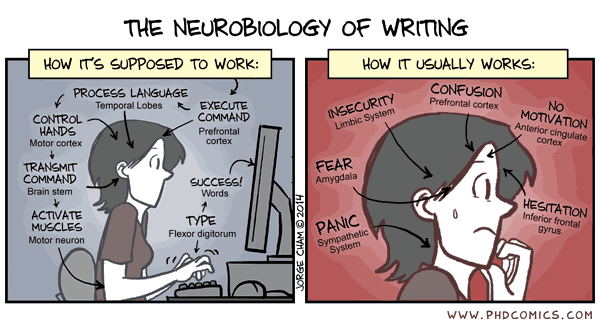Blog post
On Writer’s/Creator’s Block

The inevitable blank page is back. Where did all of that creative intention go? How can you make the words start flowing again?
Next Scientist’s post 12 Tips To Overcome Writer’s Block For PhD Students is our top recommendation for anyone struggling with their thesis or stuck on a research paper.
Academic Writer’s Block: A Matter of Form? is an essay by Inside Higher Ed writer, Liana Silva, who reflects on her ease as a blogger compared to the challenge and anxiety when writing in academic form. Her post is an attempt to make the messy process of academic writing visible. From the Overland Literary Journal, On Writer’s Block by Rjurik Davidson gets into the research behind the resistance to write and the science behind negative self-talk. University Affairs Magazine article Rituals of Writing by Melonie Fullick, PhD candidate at York University, shares the “rituals” she habitually uses to get herself into gear for academic writing. Fullick also gives advice on how to generate momentum to return to work over and over again, re-articulate the same ideas in better ways, and eventually, develop new ones. She also explores the perfectionist tendencies that plague those with writing issues, telling us that “blocks” — and procrastination — are caused by underlying fear that nothing we can write (or think) will be good enough.
The Telegraph’s article, How To Cure Writers Block, shares some practical and eclectic tips from a few well-known contemporary writers. Zadie Smith and Nick Hornby both use the programs Freedom and SelfControl to prevent procrastination by blocking users from accessing certain sites online. Victor Hugo, writing in the days when the great outdoors was the place to find some fun, used to get his valet to hide his clothes from him, forcing him to stay indoors and write. Dan Brown keeps an hourglass on his desk and on the hour every hour, sets aside his manuscript to do push-ups, sit-ups and stretches. Phillip Roth apparently paces whilst thinking, and claims to walk half a mile for every page that he gets written.
Check out Flavorwire’s piece on 13 famous writers and their strategies for pushing through writers block - advice that dates back to the early 1700’s is timeless. George Plimpton said to “pretend that you’re writing not to your editor or to an audience or to a readership, but to someone close, like your sister, or your mother, or someone that you like.” Philip Pullman tells us that “writer’s block is a condition that affects amateurs and people who aren’t serious about writing." Meaning, a professional writer is someone who writes just as well when they’re not inspired as when they are.” Hemingway? “The best way is always to stop when you are going good and when you know what will happen next. If you do that every day … you will never be stuck.”
From the Brain Pickings Blog, The Psychology of Writing and the Cognitive Science of the Perfect Daily Routine, explains how to sculpt an environment that optimizes creative flow and summons relevant knowledge from your long-term memory through the right retrieval cues. A large portion of this article draws on the 1994 volume The Psychology of Writing, cognitive psychologist Ronald T. Kellogg explores how work schedules, behavioral rituals, and writing environments affect the amount of time invested in trying to write and the degree to which that time is spent in a state of boredom, anxiety, or creative flow. Brain Pickings also recommends How to Break Through Your Creative Block: Strategies from 90 of Today’s Most Exciting Creators, a small but potent compendium of field-tested, life-approved insight on optimizing the creative process from some of today’s most exciting artists, designers, illustrators, writers, and thinkers.

